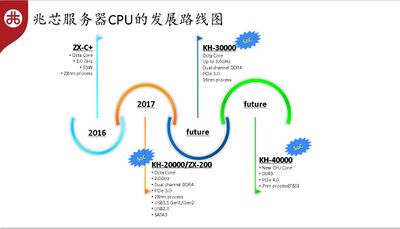From WikiChip
KaisHeng (KH) - Zhaoxin
| KaisHeng | |
| Developer | Zhaoxin |
| Manufacturer | TSMC |
| Type | Microprocessors |
| Introduction | 2017 (announced) 2018 (launch) |
| ISA | x86 |
| µarch | WuDaoKou, LuJiaZui |
| Word size | 64 bit 8 octets
16 nibbles |
| Process | 28 nm 0.028 μm
2.8e-5 mm |
| Technology | CMOS |
| Succession | |
| ← | |
| QuadCore | |
KaisHeng (KH) is a family of x86 microprocessors developed by Zhaoxin for the Chinese market. This family is primarily targeting server and networking devices.
Overview[edit]
Announced in late 2017 and officially launched in early 2018, the KH series is primarily designed for general-purpose servers. Those chips are fully SoCs solutions that come with an optional I/O extension chipsets.
Models[edit]
KH-20000[edit]
- Main article: WuDaoKou microarchitecture
The KH-20000 (KH-20k) series is based on the WuDaoKou microarchitecture and is fabricated on HLMC's 28 nm process. Those parts all include the following common features:
- ISA: Everything up to AVX (SMM, FPU, NX, MMX, SSE, SSE2, SSE3, SSSE3, SSE4.1, SSE4.2, AES, SM3, SM4, and AVX)
- Tech: VT-x/EPT, TXT
- Mem: Up 64 GiB of dual-channel 2133 MT/s DDR4
KH-30000[edit]
- Main article: LuJiaZui microarchitecture
The KH-30000 is a planned series of processors based on LuJiaZui set to be fabricated on TSMC's 16 nm process.
KH-40000[edit]
The KH-40000 is a planned series of processors set to be fabricated on TSMC's 7 nm process.
Facts about "KaisHeng (KH) - Zhaoxin"
| designer | Zhaoxin + |
| first announced | 2017 + |
| first launched | 2018 + |
| full page name | zhaoxin/kaisheng + |
| instance of | microprocessor family + |
| instruction set architecture | x86 + |
| main designer | Zhaoxin + |
| manufacturer | TSMC + |
| microarchitecture | WuDaoKou + and LuJiaZui + |
| name | KaisHeng + |
| process | 28 nm (0.028 μm, 2.8e-5 mm) + |
| technology | CMOS + |
| word size | 64 bit (8 octets, 16 nibbles) + |
